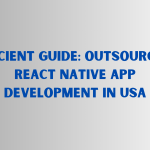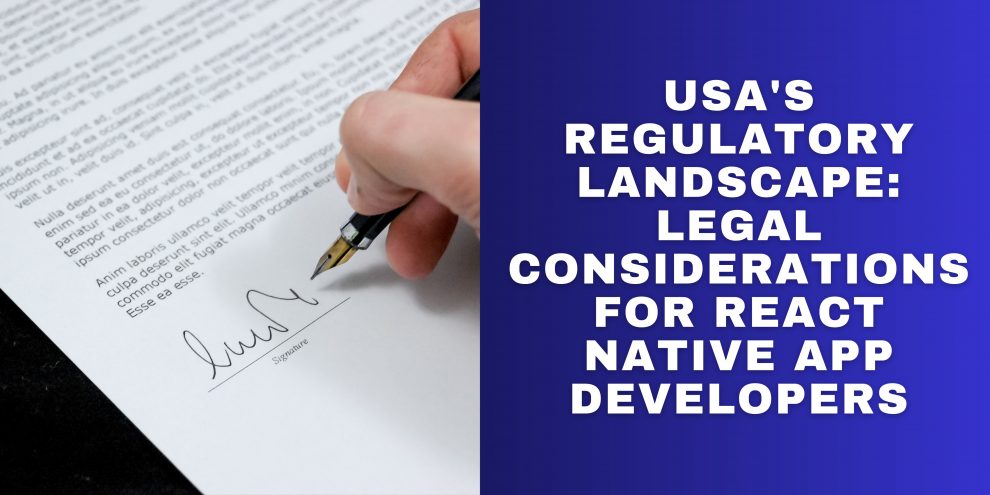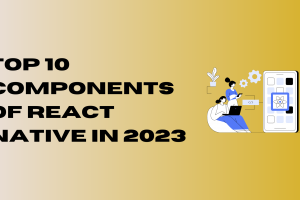In the ever-evolving world of mobile app development, React Native has emerged as a popular framework for creating cross-platform applications. As of 2023, app developers continue to innovate and release new apps to cater to the ever-expanding user base. However, amidst the creativity and innovation, it’s crucial to stay compliant with the regulatory environment in the United States to avoid legal complications. In this blog, we’ll delve into six key legal considerations that React Native app developers should keep in mind when developing and launching their apps in the USA.
Privacy and Data Protection
Privacy and data protection are pivotal concerns for app developers in the United States. Comprehending and complying with federal and state regulations is essential, with two key laws taking the forefront:
California Consumer Privacy Act (CCPA):
CCPA bestows Californian residents with extensive rights over their personal data. If your app collects data from California users, you must provide clear mechanisms for opting out of data sharing and offer transparent data usage disclosures. Moreover, you need a comprehensive privacy policy detailing data practices.Health Insurance Portability and Accountability Act (HIPAA):
Apps dealing with health-related data must adhere to HIPAA regulations. If your React Native app processes protected health information (PHI), stringent measures like data encryption, access controls, and safeguards against unauthorized disclosures are obligatory.
To ensure compliance, collaborate with legal experts and data privacy specialists to craft a robust privacy policy, implement data protection measures, and conduct regular audits of your data-handling practices.
Accessibility Compliance
Accessibility isn’t just a legal requirement; it’s also an ethical imperative. Under the Americans with Disabilities Act (ADA), digital platforms, including mobile apps, must be accessible to individuals with disabilities. This encompasses:
Screen Reader Compatibility:
Ensure that your app is compatible with screen reader technologies to make it usable for users with visual impairments.Alternative Text for Images:
Provide descriptive alternative text for images to assist users with visual impairments in comprehending content.Keyboard Navigation:
Implement keyboard navigation to enable users who cannot use touch screens to navigate your app effectively.
Neglecting ADA guidelines can lead to legal repercussions, including lawsuits and fines. Engage accessibility experts, conduct comprehensive testing, and contemplate the use of development tools that focus on accessibility to guarantee compliance.
Intellectual Property Rights
Shielding your app’s intellectual property is critical for preserving its uniqueness and value. Here’s what you need to contemplate:
Copyright Protection:
Ensure that your app’s code, creative assets, and content are adequately copyrighted. Copyright protection extends to visual design, graphics, audio, video, and textual content.Third-party Libraries and Licenses:
When employing third-party libraries and components, meticulously scrutinize their licenses to ensure they align with your app’s intended use. Violating licensing terms can result in legal disputes.Trademark Protection:
If your app boasts distinctive branding elements, logos, or names, think about registering trademarks to prevent others from utilizing similar marks.Patent Considerations:
In cases of truly innovative features or functionalities, explore patent protection to secure your app’s unique technologies.
Consult with intellectual property attorneys to formulate a comprehensive strategy for safeguarding your app’s creative and technical assets.
In-App Purchases and App Store Guidelines
For apps offering in-app purchases, adhering to app store guidelines is imperative:
Apple’s App Store and Google Play:
Both platforms have stringent guidelines governing in-app purchases. Ensure that your app’s purchase mechanisms align with these rules to prevent removal from app stores.Transaction Processing Laws:
Familiarize yourself with transaction processing laws, including those related to digital goods and services. Comply with tax regulations, refund policies, and payment security standards.Subscription Models:
If your app offers subscriptions, consider the legal aspects of auto-renewals, cancellation policies, and transparent pricing.
Conduct a thorough review of the guidelines provided by the respective app stores and think about consulting legal experts specializing in app store compliance to ensure that your in-app purchase systems fulfill all necessary requirements.
COPPA Compliance
If your React Native app caters to children under the age of 13, strict compliance with the Children’s Online Privacy Protection Act (COPPA) is mandatory. COPPA imposes several obligations:
Verifiable Parental Consent:
Before collecting personal information from children, you must obtain verifiable parental consent.Clear Privacy Notices:
Provide clear and concise privacy notices tailored to parents.Secure Data Practices:
Implement robust security measures to safeguard children’s data.
Non-compliance with COPPA can result in substantial fines and harm to your reputation. Engage legal experts specializing in COPPA compliance to ensure that your app’s design, features, and data handling practices align with COPPA’s requirements.
Staying Informed and Seeking Legal Advice
The regulatory landscape for mobile apps is dynamic, with laws and guidelines continually evolving. To stay compliant:
Monitor Legal Updates:
Regularly review updates to federal and state laws, industry standards, and app store policies that may impact your app.Engage in Industry Discussions:
Join developer forums, participate in legal webinars, and connect with peers to stay informed about emerging legal developments.Legal Counsel:
When in doubt, seek legal advice from attorneys specializing in technology and mobile app development. They can help you navigate the complex legal terrain and minimize potential legal risks.
Conclusion
In conclusion, developing a React Native app is an exhilarating journey, but it carries significant legal responsibilities. Addressing these six key legal considerations — privacy, accessibility, intellectual property, in-app purchases, COPPA compliance, and staying informed — is essential for building a successful app that adheres to the USA’s regulatory landscape in 2023. At GeekyAnts, we understand the importance of legal compliance in app development. Our team of experienced developers and legal experts can guide you through the complexities of the regulatory landscape, ensuring that your React Native app meets all necessary legal requirements while delivering a seamless user experience. Building a successful app is not just about coding; it’s about creating a secure and trustworthy platform that users can rely on.
FAQs
What are the key privacy laws affecting React Native app developers in the USA?
The key privacy laws include the California Consumer Privacy Act (CCPA) and the Health Insurance Portability and Accountability Act (HIPAA), among others, depending on the nature of the data your app collects and handles.
How do I comply with in-app purchase guidelines from app stores like Apple’s App Store and Google Play?
Compliance involves following the specific guidelines set by app stores, ensuring transparency in pricing, adhering to transaction processing laws, and providing a user-friendly purchasing experience.
Where can I stay updated on changes in the regulatory landscape for app development in the USA?
To stay informed, monitor legal updates at both federal and state levels, participate in industry discussions, and consider seeking guidance from legal experts specializing in technology and app development.
Recommended Reads:

























